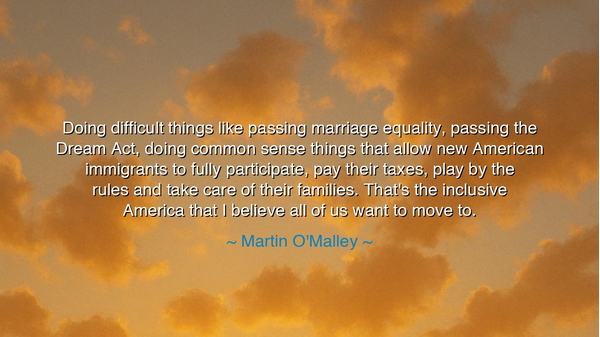
Doing difficult things like passing marriage equality, passing
Doing difficult things like passing marriage equality, passing the Dream Act, doing common sense things that allow new American immigrants to fully participate, pay their taxes, play by the rules and take care of their families. That's the inclusive America that I believe all of us want to move to.






Hear, O seeker of truth, the words of Martin O’Malley, who spoke not only of politics but of the soul of a nation: “Doing difficult things like passing marriage equality, passing the Dream Act, doing common sense things that allow new American immigrants to fully participate, pay their taxes, play by the rules and take care of their families. That's the inclusive America that I believe all of us want to move to.” These words shine with the light of aspiration, for they point toward a land not divided by fear or prejudice, but bound together by justice, dignity, and shared belonging.
O’Malley begins by invoking the challenge of difficult things. For nothing noble is ever gained easily. To pass marriage equality required courage against centuries of prejudice. It was a battle not only of laws but of hearts, fought in courts, in streets, and in families. Yet, when victory was won, millions of men and women were no longer strangers in their own country, but recognized as full citizens in love and law. This was no small triumph; it was proof that justice, though slow, can overcome the chains of tradition when guided by compassion.
He speaks also of the Dream Act, the hope of the children of immigrants who grew up beneath the stars of America though not born to its soil. These Dreamers, innocent and ambitious, sought only the chance to study, to work, to live without fear of exile. Their plight mirrors the struggles of countless generations before them, from the Irish fleeing famine to the Jews escaping persecution. Each wave of newcomers faced suspicion, yet each wave also built America’s strength. To deny the Dreamers was to deny the very story of the nation itself.
Then O’Malley names the immigrants who come with open hands and willing hearts, who labor in fields, in factories, in hospitals, and who give back in taxes, in service, in loyalty. These new Americans do not come to exploit but to play by the rules, to build homes, raise children, and weave their futures into the fabric of the land. History teaches us that such inclusion is the lifeblood of progress. Recall the story of Andrew Carnegie, an immigrant boy from Scotland, who through industry and vision became a titan of steel and a patron of libraries. His life demonstrates that when doors are open, the blessings flow not only to the newcomer but to the nation as a whole.
The vision O’Malley describes is one of inclusive America—a land where equality is not a dream deferred but a reality shared. This inclusiveness is not weakness, but strength. It is the recognition that a society flourishes when every voice is heard, every hand has work, and every family has dignity. To exclude is to weaken; to include is to fortify. For a house divided against itself cannot stand, but a house built with many stones endures the storm.
Beloved, the meaning is clear: the path of inclusion is the path of life, but it demands courage. Laws that expand freedom are not easy to pass; they require leaders who place principle above popularity, and citizens who rise beyond fear. Yet the fruits of such effort are rich: stronger families, stronger communities, stronger nations. The story of America has always been the story of opening the circle wider, of expanding the promise of liberty to those once shut out.
What lesson, then, shall we draw? That we, too, must embrace difficult things. We must stand for justice even when it is unpopular, defend the stranger even when it is risky, and seek unity even when division is easier. In daily life, this means welcoming the neighbor, respecting differences, and demanding leaders who uphold fairness. It means seeing the humanity in every person, whether citizen by birth or by choice.
Thus, let O’Malley’s words guide you. They are a call not merely for policy but for vision—for a nation that fulfills its creed of liberty and justice for all. Walk, then, toward this inclusive America, not with hesitation but with resolve. For when each of us chooses compassion over fear, unity over division, and justice over complacency, the dream of equality becomes not only law but living truth. And in such a land, all may dwell in dignity, and the nation shall endure as a beacon for generations yet unborn.






AAdministratorAdministrator
Welcome, honored guests. Please leave a comment, we will respond soon